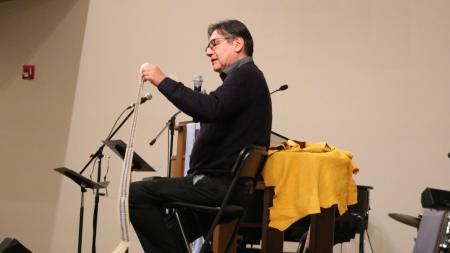Civic Engagement

In the midst of such turbulent times, we may wonder what’s true, what we can do and how we should live. There are temptations to retreat from all that’s happening or to watch wide-eyed and paralyzed.
In times like these, I hold even tighter to the call we find throughout Scripture to trust God and to actively engage in our society. Over and over, God invites us to be involved in bringing His Kingdom, His shalom and His justice to bear in the relational and societal challenges we face.
One of my favourite verses, Micah 6:8 says, “what does the Lord require of you but to love kindness, seek justice and walk humbly with your God.”
This and many other verses remind me that our faith is meant to be lived out in public. We do that by actively seeking the good of those around us and of our country (Jeremiah 29:7).
Jesus summarized the law like this: “Love the Lord your God with your whole heart, soul, mind and strength. This is the first and greatest commandment. And the second is like it: love your neighbour as yourself.”
The laws and policies we have on the books determine whose life is treated with value in our society
Loving our neighbour is one of the ways we live out our love for God.
The people of Israel and followers of Jesus were expected to care for one another as God’s people. They were also commanded to take particular care of those who are vulnerable. Many times, God’s people are instructed to care for the foreigner, the widow, the orphan and those who are poor in their midst. “Defend the weak and the fatherless; uphold the cause of the poor and the oppressed” (Psalm 82:3).
Caring for our neighbours who are vulnerable, seeking the good of others and the good of the country where God has placed us is at the heart of who we are to be as followers of Jesus.
Civic engagement is one of the ways we do this. In a democracy like ours, this can mean advocating for and supporting good laws and policies, and participating in the electoral process.
Public policy has a significant and direct impact on the kind of society we live in. Our laws and policies influence how we live. They influence how we organize our communities, schools, churches, businesses, health care, our social services and safety net, and so on.
The laws and policies we have on the books determine whose life is treated with value in our society, who is protected, treated justly, supported to live – and who is not. They shape how we deal with issues of social concern, and how we understand and carry out justice and fairness as a society.
An election campaign offers us some of those opportunities to participate.
It’s important that we are part of the conversations that shape our society and our culture.
It’s equally important that as we engage, we do so responsibly and respectfully. I’m always asking myself: How does what we are saying, how we are saying it, and the way we are engaging reflect Jesus to a world that isn’t just watching, but scrutinizing?
How we engage matters. We seek to engage with grace, patience, gentleness and, when needed, self-control. We try to be respectful of those whose views differ from our own.
Those we disagree with – whether they are neighbours, candidates or political parties – are likely acting out of what they believe is best for the country. They may have different understandings of what is good for Canada and for Canadians. Respectful dialogue recognizes that and tries to find common ground where possible.
In Canada, we have the privilege of engaging in the conversations and processes that shape our society.
An election campaign offers us some of those opportunities to participate. We can learn about the plans and priorities of the different parties. We can share our concerns with candidates and ask questions of them. We can join a political party if there’s one we believe in and want to be a part of. And we can exercise our right to vote.
I suspect many of us struggle to feel at home in any particular political party. We may feel like our vote won’t make a difference. But voting for our leaders is both a responsibility and a privilege in a democracy.
When candidates come to your door – even those you might not vote for – it is an opportunity to develop relationships. One of these candidates will be elected to represent you and your neighbourhood. This is an excellent time to get to know them and what they think on important issues. It’s also an opportunity to share with them what you care about. Those relationships and connections will form a foundation for future conversations on issues of concern and help us engage well down the road.
I encourage you to look into the candidates running in your riding. Who are they? What are they about? Whose priorities align best with the things that matter most to you? And while you may not find a perfect fit, you can identify the best possible option (or, in some cases, the least worst option).
And then vote for the candidate who most closely aligns with your views. This is a simple, tangible way to seek the best for our country.
And we can pray: for candidates, voters and the good of our country. We can pray for wisdom, peace, justice and good government.




